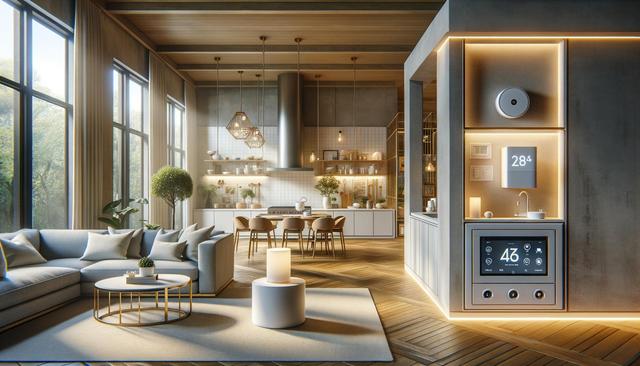Smart Home Improvements That Can Boost Property Value
Add value to your home with smart improvements like installing energy-efficient appliances, smart thermostats, or home security systems. These upgrades enhance convenience, comfort, and sustainability, making your home more attractive to modern buyers.

Smart Thermostats and Climate Control
One of the most practical smart home upgrades is the installation of a smart thermostat. These devices offer enhanced control over heating and cooling systems, allowing homeowners to optimize energy use and reduce utility bills. Many smart thermostats learn user preferences over time and adjust automatically, creating a more efficient and comfortable living environment. For prospective buyers, this feature is both appealing and cost-effective.
Smart thermostats can often be controlled remotely through mobile apps, giving homeowners the ability to adjust temperature settings from anywhere. This not only improves comfort but adds a layer of convenience that aligns with modern lifestyle expectations. Additionally, some models integrate with weather forecasts, adjusting settings based on current conditions.
Benefits of smart thermostats include:
- Lower energy consumption
- Customizable heating and cooling schedules
- Remote access and control
- Integration with other smart home devices
By demonstrating energy savings and technological convenience, a smart thermostat can make a strong impression on potential buyers evaluating a property’s long-term value.
Home Security and Surveillance Systems
Smart home security systems are becoming increasingly popular as homeowners seek to protect their properties with greater efficiency and reliability. Installing a modern security setup that includes smart locks, video doorbells, and surveillance cameras can significantly enhance your home’s appeal. These features not only offer peace of mind but also demonstrate a forward-thinking approach to home management.
Smart locks can allow for keyless entry, temporary digital keys for guests or service providers, and real-time access logs. Video doorbells and security cameras provide visual monitoring capabilities, often with motion detection and alert systems that notify homeowners of unusual activity.
Core components of a smart security system might include:
- Smart locks and digital entry systems
- Video doorbells with two-way communication
- Motion-activated outdoor cameras
- Mobile app integration for real-time monitoring
These security features not only deter unwanted activity but also contribute to the overall sense of safety and modernity that today’s homebuyers are increasingly seeking in their next purchase.
Energy-Efficient Appliances and Lighting
Replacing traditional appliances and lighting with energy-efficient, smart alternatives is a savvy way to improve both functionality and property value. Smart appliances, such as refrigerators, washing machines, and ovens, offer remote operation, usage tracking, and energy-saving modes. These features appeal to environmentally conscious buyers and those looking to reduce long-term operating costs.
Smart lighting systems allow for customizable ambiance, remote control, and automation based on occupancy or time of day. Integrating LED smart bulbs with voice control or mobile apps can enhance the home’s convenience and lower electricity usage.
Consider upgrading:
- Kitchen appliances that offer smart diagnostics and energy monitoring
- Lighting systems with scheduling and voice control
- Washer and dryer units that optimize water and energy use
These improvements show that the home is not only modern but also designed with efficiency and sustainability in mind—two increasingly important factors for today’s buyers.
Smart Irrigation and Landscaping Technology
Outdoor smart technology is another area that can add curb appeal and practicality. Smart irrigation systems use weather data and soil moisture levels to water lawns and gardens only when necessary. This reduces water waste and keeps landscaping healthy without constant supervision.
Many smart sprinkler systems are app-controlled and allow for scheduling, zone management, and leak detection. This is particularly valuable in regions where water conservation is a priority or where maintaining a lush yard is a challenge.
Advantages of smart irrigation include:
- Optimized water usage
- Healthier landscaping with less effort
- Lower utility bills due to efficient watering
- Remote monitoring and control
By automating outdoor maintenance, homeowners can save time and resources while presenting a well-kept exterior that enhances the visual appeal of the property.
Integrated Smart Home Systems and Hubs
While individual smart devices are beneficial, integrating them into a centralized smart home system can provide an exceptional user experience. Smart hubs or voice-activated assistants allow various devices to work together seamlessly. For example, a single command can adjust lighting, temperature, and security settings simultaneously.
Homes equipped with integrated systems demonstrate a high level of functionality and cohesiveness, which can greatly impress potential buyers. These systems often support automation routines that make daily tasks more convenient, such as setting a “Good Morning” scene that turns on lights, adjusts the thermostat, and starts a coffee maker.
Common components of an integrated smart system include:
- Smart speakers or voice assistants
- Centralized control apps
- Routine and automation capabilities
- Compatibility with third-party devices
When these systems are professionally installed and well-documented, they can be a strong selling point and indicate that the home is ready for the future of digital living.